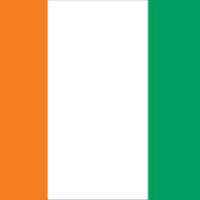The locals of Côte d’Ivoire, like their dress, food, and related customs, mirrored the ethnically diverse culture in the country (Mahamadou, 2021). Different clothes are associated with different areas and tribes; for example, the colorful kente costume of the Akan ethnic group and the bogolan of the Mandé peoples, and traditional costumes are unique and reflect the people’s skillful craftsmanship (Iloh et al., 2021). As much as these products are cultural symbols of these communities, they are also exported as exotic and expensive fashion accessories. Also, most Ivorian designers have incorporated contemporary fashion with the cultural practices, thus marketing the importance of Ivorian clothing to the world (Kareem & Wieck, 2021). This has a culture of interdependence since Côte d’Ivoire learns from other African nations’ fashion while enhancing the culture of fashion on the continent.
Food and food preparation remain another mainstay of the culture of the Ivorians, with foods such as fufu and peanut-based sauces being depicted as the country’s sources of farming (Kouakou, 2020). The food habits of Côte d’Ivoire can be roughly akin to those of other nations of West Africa, but at the same time, this has made them somewhat interdependent in the types of foods they eat (Séraphin & Cyrille, 2022). It is also involved in festivals, social events, traditional ceremonies, their dressing, and their foods and drinks (Kareem & Wieck, 2021). As globalization advances in the country, Ivorian culture engages with the world again through their impact on sectors such as tourism, textiles, and apparel, where cultural assets, which are fashion designs, are promoted across the globe.



